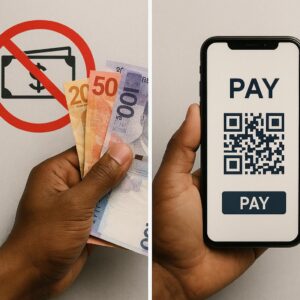by Raffy Gutierrez
Corruption in the Philippines isn’t a disease—it’s a culture. It’s a habit that has been perfected through generations, nurtured by secrecy, and preserved by leaders who benefit from its existence. Every administration vows to fight it, and every administration fails. Under President Ferdinand “Bongbong” Marcos Jr., that failure has become a polite performance—grand speeches about unity, endless ribbon cuttings, and yet not a single real move toward making government truly transparent in the digital age.
We are living in a time when artificial intelligence can detect financial anomalies faster than human auditors, when blockchain can trace every centavo from source to recipient, and when digital ledgers can make corruption mathematically impossible. Yet in the Philippines, we remain trapped in the analog past—counting cash with sweaty hands, signing papers in triplicate, and pretending that handwritten receipts somehow protect the public. It’s like bringing a typewriter to a cybersecurity summit—and still expecting applause.
The simplest, most logical first step toward fighting corruption is to ban cash transactions in government. Every peso that leaves the national treasury should be traceable through a secure, verifiable, and tamper-proof digital system. That’s not idealism—it’s good governance. If every barangay fund, every LGU project, and every departmental budget were transacted digitally, we could finally track where public money really goes. Digital footprints don’t lie. Paper trails burn easily.
Imagine a government where every disbursement—from road projects to classroom construction—is recorded and visible in real time. A government wallet system could make every peso accountable, timestamped, and reviewable. No more “lost documents,” no more “miscellaneous expenses,” no more ghost projects. Transparency wouldn’t be optional—it would be automatic. A digital record is the only incorruptible witness that power fears.
But for such a transformation to happen, the country needs a president who understands technology not as a buzzword, but as a way of life. BBM is not that president. He may talk about digital transformation, but there is no evidence of vision, urgency, or understanding behind his words. The Philippines doesn’t need a leader who treats technology as decoration; it needs one who treats it as destiny.
Today’s so-called “digital transformation” efforts under this administration are more show than substance. We get press releases about “E-Gov” apps that rarely work and websites that crash under minimal traffic. We see cables being laid but no national framework for cybersecurity or open data. We hear about “smart cities,” but our agencies still depend on printed memos and manual payroll. This isn’t transformation—it’s digital cosplay.
The rot of corruption festers in the shadows where money can move unrecorded. Cash enables that darkness. A paper envelope can silence a whistleblower. A handshake can erase accountability. But when every transaction is digital—when every peso leaves a digital trail—the game changes. That’s why banning cash is not merely an administrative fix. It’s a moral revolution.
Digital systems don’t get tired, they don’t forget, and they don’t collude. They record. They timestamp. They expose. Countries like Estonia, Singapore, and South Korea didn’t end corruption through moral lectures—they automated honesty. By forcing transparency through digital systems, they made theft inconvenient and honesty effortless.
In the Philippines, technology often threatens those in power because it shines light where they prefer darkness. That’s why leaders avoid it, or worse, pretend to embrace it without ever implementing it. Real digital reform requires courage—something this administration seems allergic to. The President must lead the charge, not delegate it to committees that only hold more meetings about “digital roadmaps.”
This is no longer a tech issue—it’s a national survival issue. Every unrecorded peso is a classroom that was never built, a hospital left unfinished, a flood project that exists only on paper. Every act of corruption has a human cost. It is not just about numbers—it’s about lost futures.
Some argue that banning cash will disadvantage the poor. That’s a weak excuse. In 2025, digital wallets like GCash, Maya, and GrabPay are everywhere—from urban centers to sari-sari stores. The government can easily create a national digital wallet system for citizens, allowing direct transfers for salaries, aid, or benefits. Instead of “ayuda” handed out in envelopes, why not real-time digital disbursements with public audit trails?
Time and again, scandals expose the same flaw: the absence of a digital paper trail. From fake pandemic suppliers to ghost beneficiaries, corruption thrives where systems are manual. BBM’s administration had a golden chance to change that—but instead, it embraced the comfort of the old ways. It’s not ignorance—it’s complacency.
A true digital revolution requires courage, not connections. It requires a leader who is willing to face the angry bureaucrats who profit from inefficiency and the politicians who fear transparency. The government doesn’t need more slogans—it needs a system where lying becomes difficult, and honesty becomes automatic.
Technology is not just a tool—it’s the greatest equalizer of our era. It removes shadows and forces truth to surface. The Philippines needs a leader who understands that the future of governance is digital or nothing. Because the world is not waiting for us to catch up while we’re still stapling receipts, writing documents on manual typewriters, and counting coins.
If BBM truly wants to prove that his administration stands against corruption, he must start by banning cash transactions in all branches of government—today, not tomorrow. And if he won’t, then it’s time for the people to demand it or pray that the next President of the Philippines will take the lead in this extremely vital and crucial step. The next revolution will not be fought in the streets but written in code, enforced by transparency, and powered by accountability.
The time has come to ban cash and go 100% digital.




